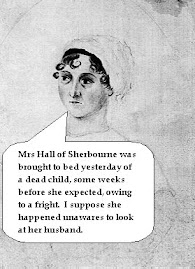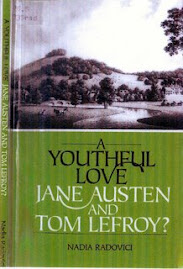On the posthumous publication of Persuasion and Northanger Abbey, Jane’s favourite brother Henry Austen described her physical appearance thus: “It might with truth be said, that her eloquent blood spoke through her modest cheek.” As Marghanita Laski points out, this is an incredibly pompous-sounding tribute - until we realise that these same words, originally from the poet John Donne, are quoted by Henry Fielding in Tom Jones to describe Sophia Western, who finally marries Jones - “Her pure and eloquent blood spoke in her cheeks”.[1]
Furthermore, Sophia Western’s complexion “had rather more of the lily than the rose; but when exercise, or modesty [emphasis added] increased her natural colour, no vermilion could equal it.” Sophia’s eyes were very dark and her black hair was “so luxuriant that it reached her middle, before she cut it to comply with modern fashion”. Louisa Austen’s description of her aunt Jane is as follows: “large dark eyes and a brilliant complexion, and long, long black hair down to her knees”[2]
From here, we may need to take another look at the “Sophia Sentiment” who wrote to James Austen’s publication The Loiterer on 28 March 1789. Some critics have already suggested that “Sophia Sentiment” was Jane Austen. Claire Tomalin does not, on the grounds that “Miss Sentiment” deplores women’s taste in literature. However, soon after this, Jane Austen uses Sophia for the heroine’s name in her satire Love and Freindship, [sic] attacking the excesses of the romantic novel, a favourite Austen theme. Tomalin suggests that repeated use of the name Sophia may have been a running family joke.[3] If this is the case, which seems likely, it is not hard to imagine where the joke originated.
Notes
[1] Marghanita Laski: Jane Austen & Her World; Henry Fielding, Tom Jones Book IV, Chapter II; John Donne (1572-1631) “Of the Progress of the Soul: the Second Anniversary” (notes to Tom Jones, Oxford University Press edition).
[2] Henry Fielding, Tom Jones Book IV, Chapter II;.Claire Tomalin, Jane Austen: A Life pp 108 & 311
[3] Claire Tomalin, pp 63 & 303-4.
Your Sunday Austen Meditation
3 years ago
















No comments:
Post a Comment